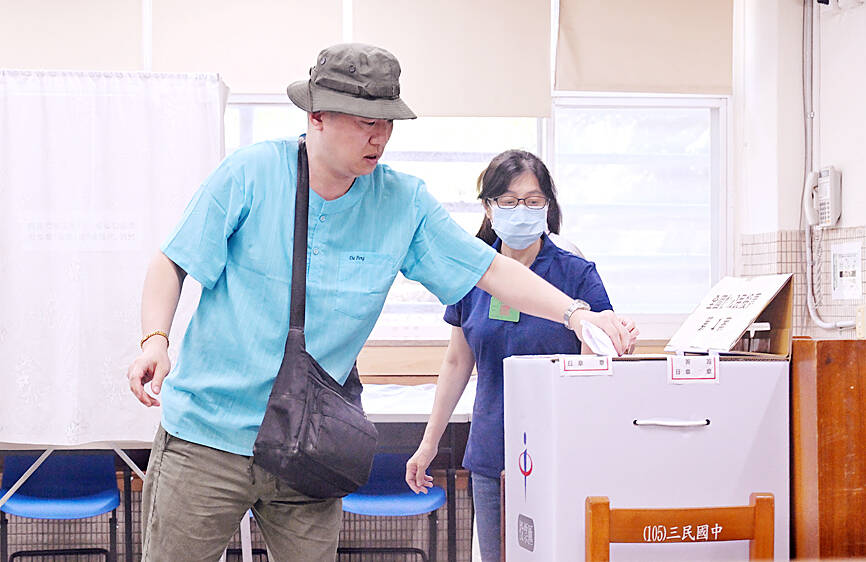Members of the Democratic Progressive Party (DPP) and a civic group yesterday expressed objections to a Chinese Nationalist Party (KMT) push to allow absentee and mail-in voting in elections.
“The bill to allow absentee voting should first apply to national referendums so that the Central Election Commission can evaluate its feasibility. Only after that should it apply to elections,” DPP Legislator Rosalia Wu (吳思瑤) said yesterday.
“It is safer to do it this way, as the commission can detect problems, make corrections and revise the procedure,” Wu said.

Photo: Fang Pin-chao, Taipei Times
The DPP is opposed to the KMT bill, which the Taiwan People’s Party also supports, that would apply to all local and national elections, including presidential elections.
The bill would also enable mail-in ballots.
Currently, Taiwan’s election law requires people to vote in their “home district” where their household registration is, and it is common for students and people working in big cities to travel to their hometown to cast ballots.
“Amending the law to allow absentee [and mail-in] voting in elections is a big change, and there is no full agreement on how to proceed on that, so Taiwanese society should reach a consensus first,” Wu said.
There are risks concerning the application of absentee or mail-in voting in China, she said.
“If we allow absentee [and mail-in] voting, it would pose some dangers to Taiwan’s democracy. An enemy state could try to use it to subvert the democratic process, so it should be handled with extreme caution,” she added.
Taiwanese should oppose the bill, as it would make it easier for China to interfere in elections, Taiwan Economic Democracy Union convener Lai Chung-chiang (賴中強) said.
“For both absentee voting and mail-in ballot methods, the biggest risk is that Beijing could use financial pressure to mobilize Taiwanese doing business in China to vote for certain candidates or political parties it favors,” Lai said.
He urged lawmakers not to allow absentee voting in Kinmen and Lienchiang (Matsu) counties, as they are extremely close to China.
“The Chinese government in the past launched such mobilization campaigns, providing low-cost air tickets and other incentives for Taiwanese working in China to return where their household registration is to vote in Taiwan’s elections,” Lai said.
“We have warned about this for years, but the government still has no effective way to deal with it, as it is difficult to investigate and find solid evidence of vote-buying, which might have happened beyond its jurisdiction,” he added.
On the other hand, KMT Legislator Lin Pei-hsiang (林沛祥) said that “many democratic countries, including the US, have absentee voting, so we can follow its method and introduce such a bill to move our country forward.”

Three Taiwanese airlines have prohibited passengers from packing Bluetooth earbuds and their charger cases in checked luggage. EVA Air and Uni Air said that Bluetooth earbuds and charger cases are categorized as portable electronic devices, which should be switched off if they are placed in checked luggage based on international aviation safety regulations. They must not be in standby or sleep mode. However, as charging would continue when earbuds are placed in the charger cases, which would contravene international aviation regulations, their cases must be carried as hand luggage, they said. Tigerair Taiwan said that earbud charger cases are equipped

Foreign travelers entering Taiwan on a short layover via Taiwan Taoyuan International Airport are receiving NT$600 gift vouchers from yesterday, the Tourism Administration said, adding that it hopes the incentive would boost tourism consumption at the airport. The program, which allows travelers holding non-Taiwan passports who enter the country during a layover of up to 24 hours to claim a voucher, aims to promote attractions at the airport, the agency said in a statement on Friday. To participate, travelers must sign up on the campaign Web site, the agency said. They can then present their passport and boarding pass for their connecting international

WEATHER Typhoon forming: CWA A tropical depression is expected to form into a typhoon as early as today, the Central Weather Administration (CWA) said yesterday, adding that the storm’s path remains uncertain. Before the weekend, it would move toward the Philippines, the agency said. Some time around Monday next week, it might reach a turning point, either veering north toward waters east of Taiwan or continuing westward across the Philippines, the CWA said. Meanwhile, the eye of Typhoon Kalmaegi was 1,310km south-southeast of Oluanpi (鵝鑾鼻), Taiwan’s southernmost point, as of 2am yesterday, it said. The storm is forecast to move through central

The age requirement for commercial pilots and airline transport pilots is to be lowered by two years, to 18 and 21 years respectively, to expand the pool of pilots in accordance with international standards, the Ministry of Transportation and Communications announced today. The changes are part of amendments to articles 93, 119 and 121 of the Regulations Governing Licenses and Ratings for Airmen (航空人員檢定給證管理規則). The amendments take into account age requirements for aviation personnel certification in the Convention on International Civil Aviation and EU’s aviation safety regulations, as well as the practical needs of managing aviation personnel licensing, the ministry said. The ministry